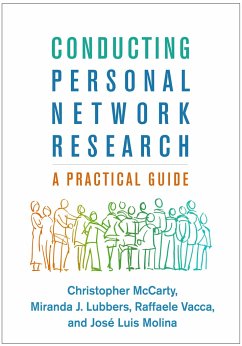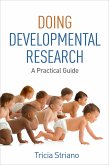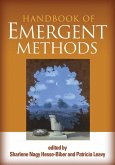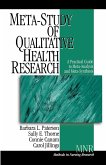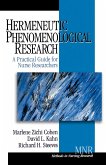Christopher McCarty, Miranda J Lubbers, Raffaele Vacca, José Luis Molina
Conducting Personal Network Research
A Practical Guide
Christopher McCarty, Miranda J Lubbers, Raffaele Vacca, José Luis Molina
Conducting Personal Network Research
A Practical Guide
- Broschiertes Buch
- Merkliste
- Auf die Merkliste
- Bewerten Bewerten
- Teilen
- Produkt teilen
- Produkterinnerung
- Produkterinnerung
Written at an introductory level and featuring engaging case examples, this book reviews the theory and practice of personal and egocentric network research. This approach offers powerful tools for capturing the impact of overlapping, changing social contexts on individuals' attitudes and behavior.
Andere Kunden interessierten sich auch für
![Applied Qualitative Research Design Applied Qualitative Research Design]() Margaret R. RollerApplied Qualitative Research Design63,99 €
Margaret R. RollerApplied Qualitative Research Design63,99 €![Evaluation Essentials Evaluation Essentials]() Marvin C AlkinEvaluation Essentials52,99 €
Marvin C AlkinEvaluation Essentials52,99 €![Doing Developmental Research Doing Developmental Research]() Tricia StrianoDoing Developmental Research42,99 €
Tricia StrianoDoing Developmental Research42,99 €![Handbook of Emergent Methods Handbook of Emergent Methods]() Handbook of Emergent Methods94,99 €
Handbook of Emergent Methods94,99 €![Creating Winning Grant Proposals Creating Winning Grant Proposals]() Anne L RothsteinCreating Winning Grant Proposals48,99 €
Anne L RothsteinCreating Winning Grant Proposals48,99 €![Meta-Study of Qualitative Health Research Meta-Study of Qualitative Health Research]() Barbara L. PatersonMeta-Study of Qualitative Health Research89,99 €
Barbara L. PatersonMeta-Study of Qualitative Health Research89,99 €![Hermeneutic Phenomenological Research Hermeneutic Phenomenological Research]() Marlene Zichi CohenHermeneutic Phenomenological Research89,99 €
Marlene Zichi CohenHermeneutic Phenomenological Research89,99 €-
-
-
Written at an introductory level and featuring engaging case examples, this book reviews the theory and practice of personal and egocentric network research. This approach offers powerful tools for capturing the impact of overlapping, changing social contexts on individuals' attitudes and behavior.
Produktdetails
- Produktdetails
- Verlag: Guilford Publications
- Seitenzahl: 270
- Erscheinungstermin: 1. April 2019
- Englisch
- Abmessung: 255mm x 179mm x 18mm
- Gewicht: 526g
- ISBN-13: 9781462538386
- ISBN-10: 146253838X
- Artikelnr.: 53215138
- Verlag: Guilford Publications
- Seitenzahl: 270
- Erscheinungstermin: 1. April 2019
- Englisch
- Abmessung: 255mm x 179mm x 18mm
- Gewicht: 526g
- ISBN-13: 9781462538386
- ISBN-10: 146253838X
- Artikelnr.: 53215138
Christopher McCarty, PhD, is Professor and Chair of Anthropology at the University of Florida, where he is also Director of the Bureau of Economic and Business Research. He has done research on personal networks since the 1980s and is the developer of EgoNet, the first program for the collection and analysis of personal network data. Dr. McCarty has conducted studies of migration, disasters, substance abuse, homelessness, and racism. Along with his coauthors, he conducted the largest personal network study of migrants to date, using data from Spain and the United States. Miranda J. Lubbers, PhD, is Associate Professor in the Department of Social and Cultural Anthropology at the Universitat Autònoma de Barcelona, Spain, and Director of the Research Group on Fundamental and Oriented Anthropology. Dr. Lubbers has investigated personal networks in the area of migration and transnationalism, poverty and livelihood strategies, and social cohesion in Spain. Currently she directs two research projects using personal networks. She also co-organizes a biennial international summer school in Personal Network Analysis. Raffaele Vacca, PhD, is Research Assistant Professor of Sociology at the University of Florida. Dr. Vacca designed and conducted one of the first personal network surveys among international migrants in Italy. In the past few years he has taught courses and workshops on quantitative methods and statistical software for social network analysis at several international conferences and universities in Europe, the United States, and Latin America. His current interests focus on international migration, health disparities, social networks, and science and scientific collaboration. José Luis Molina, PhD, is Associate Professor in the Department of Social and Cultural Anthropology at the Universitat Autònoma de Barcelona, Spain. He is also president of the University's Research Ethics Committee. Dr. Molina is an economic anthropologist who studies the emergence of socioeconomic structures such as migrant enclaves and transnational fields. He is interested in mixed-methods approaches combining ethnography and personal network analysis, with a focus on Southeast Europe, and Romania in particular.
Prologue
1. Introduction
What Is This Chapter About?
1.1 Everyone Has a Personal Network
1.2 The Size, Composition, and Structure of Personal Networks
1.3 Egos, Alters, Egocentric Networks, and Sociocentric Networks
1.4 Should I Use Personal Network or Whole Network Analysis?
Box: Combining Personal and Whole Networks
1.5 Who Is This Book For?
1.6 Book Overview
Chapter Summary
2. How Personal Networks Have Been Used So Far
What Is This Chapter About?
2.1 A Brief History of Personal Network Analysis
Box: The Bott Hypothesis about Conjugal Roles and Social Networks
Box: Clyde Mitchell and the Manchester School
Box: The Small World Experiment
Box: The East York Studies
2.2 What We Currently Know about Personal Networks
2.3 Theoretical Frameworks for Effects of Personal Networks on Individual
Outcomes
2.4 Final Remarks
Chapter Summary
Further Reading
3. Developing a Research Question
What Is This Chapter About?
3.1 Research Questions, Hypotheses, and Objectives
3.2 Outcomes and Social Determinants
3.3 Real or Perceived?
3.4 Some Examples of Questions and Hypotheses in Personal Network Research
Chapter Summary
Further Reading
4. Getting Started: Selecting a Population, Survey Mode, and Sampling
Frames
What Is This Chapter About?
4.1 Deciding Whether Personal Network Analysis Is Appropriate
4.2 Selecting a Population
Box: Neighborhood Networks and Status
Box: Emotional Support and Cognitive Functioning among the Elderly
Box: Social Support and Smoking in African American Adults
4.3 The Survey Mode
4.4 The Sampling Frame
4.5 Integration with Larger Surveys
4.6 Identifying Dependent and Explanatory Variables
Box: Loneliness and Dementia
Box: Personal Networks and Ethnic Identity
Chapter Summary
Further Reading
5. Questions about the Ego
What Is This Chapter About?
5.1 Variables and Research Aims: What Questions to Ask
Box: Personal Networks and Social Support: Comparing Two Ethnic Groups in
Southern California
5.2 Levels of Measurement
Box: Needle-Sharing and Personal Network Correlates
5.3 Wording a Question
Chapter Summary
Further Reading
6. Delineating Personal Networks: Alter Elicitation
What Is This Chapter About?
6.1 What Is a Name Generator?
Box: Contact Lists in Phones and Personal Networks
6.2 How Social Ties Are Stored in Memory and How They Are Recalled
Box: Probing
6.3 Defining the Boundaries of Personal Networks
6.4 Name Generators for Eliciting Intentional (Nonrandom) Subsets of Alters
Box: Multiple Name Generators for Social Support
Box: Single- and Multiple-Name Generators
6.5 A Name Generator for Eliciting a Random Subset of Alters
6.6 Additional Qualifiers of the Network Boundary
6.7 Alternative Approaches to Name Generators
Box: Keeping Diaries of Contacts during Three Months and Beyond
6.8 Final Remarks
Chapter Summary
Further Reading
7. Collecting Alter Attributes
What Is This Chapter About?
7.1 What Is a Name Interpreter?
7.2 What We Really Know about Alters
Box: Alters' Real Attributes or the Ego's Perception of Their Attributes?
7.3 Questions about the Attributes of Alters
7.4 Questions about Relationships between the Ego and the Alter
Box: Tie Strength: Closeness, Duration of Relationship, or Frequency of
Contact?
Box: Level of Knowing, Duration of Relationship, and Frequency of Contact
Box: The Friendship Label
7.5 How Many Questions about Alters? Respondent Burden
Box: Ordering Questions about Alters Alterwise or Questionwise
Chapter Summary
Further Reading
8. Collecting Data about Ties between Alters
What Is This Chapter About?
8.1 What Is an Edge Interpreter?
8.2 What We Really Know about Alter-Alter Ties
8.3 Alter-Alter Prompts
Box: Detailed Answer Categories for Smaller Personal Networks
8.4 Respondent Burden
Box: The Reliability of Respondents' Evaluations of Alter-Alter Ties
Box: A Different Way to Explore Network Structure and Composition
Chapter Summary
Further Reading
9. Visualizing Personal Networks
What Is This Chapter About?
9.1 Personal Network Visualization: Basic Principles
9.2 Collecting Personal Network Data through Visual Displays
9.3 Network Visualizations as Cues in Qualitative Interviews
9.4 Comparing Personal Networks through Visualizations
Chapter Summary
Further Reading
10. Measuring Personal Network Characteristics without Generating Names
What Is This Chapter About?
10.1 Characteristics of Larger Personal Networks
10.2 Personal Network Size
Box: The Random Mixing Assumption in the Network Scale-Up Method
10.3 Social Distance
10.4 Social Capital
10.5 Social Support
Chapter Summary
Further Reading
11. Analyzing Personal Network Composition and Structure
What Is This Chapter About?
11.1 Summarizing Name Interpreters and Edge Interpreters by Respondents
11.2 Creating Simple Compositional Variables from Personal Networks
Box: How to Use SPSS for Working with Personal Network Data
11.3 More Advanced Compositional Variables
Box: The Power of Homophily
11.4 Creating Simple Structural Variables from Personal Networks
Box: To Include or to Exclude Ego?
Box: Personality and Personal Network Structure
11.5 Creating Compositional Variables Based on More Than One Attribute
11.6 Creating Variables That Combine Composition and Structure
Box: 11.7 Adding Compositional and Structural Variables to the Dataset
Chapter Summary
Further Reading
12. Statistical Modeling with Personal Network Data: The Level of Egos
What Is This Chapter About?
12.1 Personal Network Data and Statistical Modeling
12.2 Predicting Ego-Level Dependent Variables
12.3 Models for Non-Network Dependent Variables
Box: Using Personal Network Characteristics to Predict Immigrant
Assimilation
Box: The Effect of Personal Network Exposure on Reproductive Health
Behavior
Box: A Longitudinal Analysis of Personal Support Networks and Depression
Box: Using Cluster Analysis to Find Types of Immigrants' Personal Networks
12.4 Models for Network Dependent Variables
Box: Predicting Network Dependent Variables with Generalized Linear Models
Chapter Summary
Further Reading
13. Statistical Modeling with Personal Network Data: The Level of Alters
and Ties
What Is This Chapter About?
13.1 Statistical Models for Alters or Ego-Alter Ties
Box: Testing Theories on Social Support with Hierarchical Models for
Personal Networks
13.2 Statistical Models for Alter-Alter Ties
Box: Modeling Alter-Alter Ties to Study Transitivity and Homophily
Box: Using Personal Networks to Estimate Whole Network Characteristics
through ERGMs
Box: Using SAOMs to Examine the Evolution of Alter-Alter Ties over Time
Chapter Summary
Further Reading
14. Ethics in Personal Network Research
What Is This Chapter About?
14.1 Personal Network Research and Ethical Dilemmas
14.2 Gaining Consent
14.3 Confidentiality
Box: Incentives and Respondent-Driven Sampling
14.4 Social Media and Mobile Phones
14.5 Managing and Publishing Personal Network Data
Box: Doing Network Research in Organizational Settings
Chapter Summary
Further Reading
Appendix
References
1. Introduction
What Is This Chapter About?
1.1 Everyone Has a Personal Network
1.2 The Size, Composition, and Structure of Personal Networks
1.3 Egos, Alters, Egocentric Networks, and Sociocentric Networks
1.4 Should I Use Personal Network or Whole Network Analysis?
Box: Combining Personal and Whole Networks
1.5 Who Is This Book For?
1.6 Book Overview
Chapter Summary
2. How Personal Networks Have Been Used So Far
What Is This Chapter About?
2.1 A Brief History of Personal Network Analysis
Box: The Bott Hypothesis about Conjugal Roles and Social Networks
Box: Clyde Mitchell and the Manchester School
Box: The Small World Experiment
Box: The East York Studies
2.2 What We Currently Know about Personal Networks
2.3 Theoretical Frameworks for Effects of Personal Networks on Individual
Outcomes
2.4 Final Remarks
Chapter Summary
Further Reading
3. Developing a Research Question
What Is This Chapter About?
3.1 Research Questions, Hypotheses, and Objectives
3.2 Outcomes and Social Determinants
3.3 Real or Perceived?
3.4 Some Examples of Questions and Hypotheses in Personal Network Research
Chapter Summary
Further Reading
4. Getting Started: Selecting a Population, Survey Mode, and Sampling
Frames
What Is This Chapter About?
4.1 Deciding Whether Personal Network Analysis Is Appropriate
4.2 Selecting a Population
Box: Neighborhood Networks and Status
Box: Emotional Support and Cognitive Functioning among the Elderly
Box: Social Support and Smoking in African American Adults
4.3 The Survey Mode
4.4 The Sampling Frame
4.5 Integration with Larger Surveys
4.6 Identifying Dependent and Explanatory Variables
Box: Loneliness and Dementia
Box: Personal Networks and Ethnic Identity
Chapter Summary
Further Reading
5. Questions about the Ego
What Is This Chapter About?
5.1 Variables and Research Aims: What Questions to Ask
Box: Personal Networks and Social Support: Comparing Two Ethnic Groups in
Southern California
5.2 Levels of Measurement
Box: Needle-Sharing and Personal Network Correlates
5.3 Wording a Question
Chapter Summary
Further Reading
6. Delineating Personal Networks: Alter Elicitation
What Is This Chapter About?
6.1 What Is a Name Generator?
Box: Contact Lists in Phones and Personal Networks
6.2 How Social Ties Are Stored in Memory and How They Are Recalled
Box: Probing
6.3 Defining the Boundaries of Personal Networks
6.4 Name Generators for Eliciting Intentional (Nonrandom) Subsets of Alters
Box: Multiple Name Generators for Social Support
Box: Single- and Multiple-Name Generators
6.5 A Name Generator for Eliciting a Random Subset of Alters
6.6 Additional Qualifiers of the Network Boundary
6.7 Alternative Approaches to Name Generators
Box: Keeping Diaries of Contacts during Three Months and Beyond
6.8 Final Remarks
Chapter Summary
Further Reading
7. Collecting Alter Attributes
What Is This Chapter About?
7.1 What Is a Name Interpreter?
7.2 What We Really Know about Alters
Box: Alters' Real Attributes or the Ego's Perception of Their Attributes?
7.3 Questions about the Attributes of Alters
7.4 Questions about Relationships between the Ego and the Alter
Box: Tie Strength: Closeness, Duration of Relationship, or Frequency of
Contact?
Box: Level of Knowing, Duration of Relationship, and Frequency of Contact
Box: The Friendship Label
7.5 How Many Questions about Alters? Respondent Burden
Box: Ordering Questions about Alters Alterwise or Questionwise
Chapter Summary
Further Reading
8. Collecting Data about Ties between Alters
What Is This Chapter About?
8.1 What Is an Edge Interpreter?
8.2 What We Really Know about Alter-Alter Ties
8.3 Alter-Alter Prompts
Box: Detailed Answer Categories for Smaller Personal Networks
8.4 Respondent Burden
Box: The Reliability of Respondents' Evaluations of Alter-Alter Ties
Box: A Different Way to Explore Network Structure and Composition
Chapter Summary
Further Reading
9. Visualizing Personal Networks
What Is This Chapter About?
9.1 Personal Network Visualization: Basic Principles
9.2 Collecting Personal Network Data through Visual Displays
9.3 Network Visualizations as Cues in Qualitative Interviews
9.4 Comparing Personal Networks through Visualizations
Chapter Summary
Further Reading
10. Measuring Personal Network Characteristics without Generating Names
What Is This Chapter About?
10.1 Characteristics of Larger Personal Networks
10.2 Personal Network Size
Box: The Random Mixing Assumption in the Network Scale-Up Method
10.3 Social Distance
10.4 Social Capital
10.5 Social Support
Chapter Summary
Further Reading
11. Analyzing Personal Network Composition and Structure
What Is This Chapter About?
11.1 Summarizing Name Interpreters and Edge Interpreters by Respondents
11.2 Creating Simple Compositional Variables from Personal Networks
Box: How to Use SPSS for Working with Personal Network Data
11.3 More Advanced Compositional Variables
Box: The Power of Homophily
11.4 Creating Simple Structural Variables from Personal Networks
Box: To Include or to Exclude Ego?
Box: Personality and Personal Network Structure
11.5 Creating Compositional Variables Based on More Than One Attribute
11.6 Creating Variables That Combine Composition and Structure
Box: 11.7 Adding Compositional and Structural Variables to the Dataset
Chapter Summary
Further Reading
12. Statistical Modeling with Personal Network Data: The Level of Egos
What Is This Chapter About?
12.1 Personal Network Data and Statistical Modeling
12.2 Predicting Ego-Level Dependent Variables
12.3 Models for Non-Network Dependent Variables
Box: Using Personal Network Characteristics to Predict Immigrant
Assimilation
Box: The Effect of Personal Network Exposure on Reproductive Health
Behavior
Box: A Longitudinal Analysis of Personal Support Networks and Depression
Box: Using Cluster Analysis to Find Types of Immigrants' Personal Networks
12.4 Models for Network Dependent Variables
Box: Predicting Network Dependent Variables with Generalized Linear Models
Chapter Summary
Further Reading
13. Statistical Modeling with Personal Network Data: The Level of Alters
and Ties
What Is This Chapter About?
13.1 Statistical Models for Alters or Ego-Alter Ties
Box: Testing Theories on Social Support with Hierarchical Models for
Personal Networks
13.2 Statistical Models for Alter-Alter Ties
Box: Modeling Alter-Alter Ties to Study Transitivity and Homophily
Box: Using Personal Networks to Estimate Whole Network Characteristics
through ERGMs
Box: Using SAOMs to Examine the Evolution of Alter-Alter Ties over Time
Chapter Summary
Further Reading
14. Ethics in Personal Network Research
What Is This Chapter About?
14.1 Personal Network Research and Ethical Dilemmas
14.2 Gaining Consent
14.3 Confidentiality
Box: Incentives and Respondent-Driven Sampling
14.4 Social Media and Mobile Phones
14.5 Managing and Publishing Personal Network Data
Box: Doing Network Research in Organizational Settings
Chapter Summary
Further Reading
Appendix
References
Prologue
1. Introduction
What Is This Chapter About?
1.1 Everyone Has a Personal Network
1.2 The Size, Composition, and Structure of Personal Networks
1.3 Egos, Alters, Egocentric Networks, and Sociocentric Networks
1.4 Should I Use Personal Network or Whole Network Analysis?
Box: Combining Personal and Whole Networks
1.5 Who Is This Book For?
1.6 Book Overview
Chapter Summary
2. How Personal Networks Have Been Used So Far
What Is This Chapter About?
2.1 A Brief History of Personal Network Analysis
Box: The Bott Hypothesis about Conjugal Roles and Social Networks
Box: Clyde Mitchell and the Manchester School
Box: The Small World Experiment
Box: The East York Studies
2.2 What We Currently Know about Personal Networks
2.3 Theoretical Frameworks for Effects of Personal Networks on Individual
Outcomes
2.4 Final Remarks
Chapter Summary
Further Reading
3. Developing a Research Question
What Is This Chapter About?
3.1 Research Questions, Hypotheses, and Objectives
3.2 Outcomes and Social Determinants
3.3 Real or Perceived?
3.4 Some Examples of Questions and Hypotheses in Personal Network Research
Chapter Summary
Further Reading
4. Getting Started: Selecting a Population, Survey Mode, and Sampling
Frames
What Is This Chapter About?
4.1 Deciding Whether Personal Network Analysis Is Appropriate
4.2 Selecting a Population
Box: Neighborhood Networks and Status
Box: Emotional Support and Cognitive Functioning among the Elderly
Box: Social Support and Smoking in African American Adults
4.3 The Survey Mode
4.4 The Sampling Frame
4.5 Integration with Larger Surveys
4.6 Identifying Dependent and Explanatory Variables
Box: Loneliness and Dementia
Box: Personal Networks and Ethnic Identity
Chapter Summary
Further Reading
5. Questions about the Ego
What Is This Chapter About?
5.1 Variables and Research Aims: What Questions to Ask
Box: Personal Networks and Social Support: Comparing Two Ethnic Groups in
Southern California
5.2 Levels of Measurement
Box: Needle-Sharing and Personal Network Correlates
5.3 Wording a Question
Chapter Summary
Further Reading
6. Delineating Personal Networks: Alter Elicitation
What Is This Chapter About?
6.1 What Is a Name Generator?
Box: Contact Lists in Phones and Personal Networks
6.2 How Social Ties Are Stored in Memory and How They Are Recalled
Box: Probing
6.3 Defining the Boundaries of Personal Networks
6.4 Name Generators for Eliciting Intentional (Nonrandom) Subsets of Alters
Box: Multiple Name Generators for Social Support
Box: Single- and Multiple-Name Generators
6.5 A Name Generator for Eliciting a Random Subset of Alters
6.6 Additional Qualifiers of the Network Boundary
6.7 Alternative Approaches to Name Generators
Box: Keeping Diaries of Contacts during Three Months and Beyond
6.8 Final Remarks
Chapter Summary
Further Reading
7. Collecting Alter Attributes
What Is This Chapter About?
7.1 What Is a Name Interpreter?
7.2 What We Really Know about Alters
Box: Alters' Real Attributes or the Ego's Perception of Their Attributes?
7.3 Questions about the Attributes of Alters
7.4 Questions about Relationships between the Ego and the Alter
Box: Tie Strength: Closeness, Duration of Relationship, or Frequency of
Contact?
Box: Level of Knowing, Duration of Relationship, and Frequency of Contact
Box: The Friendship Label
7.5 How Many Questions about Alters? Respondent Burden
Box: Ordering Questions about Alters Alterwise or Questionwise
Chapter Summary
Further Reading
8. Collecting Data about Ties between Alters
What Is This Chapter About?
8.1 What Is an Edge Interpreter?
8.2 What We Really Know about Alter-Alter Ties
8.3 Alter-Alter Prompts
Box: Detailed Answer Categories for Smaller Personal Networks
8.4 Respondent Burden
Box: The Reliability of Respondents' Evaluations of Alter-Alter Ties
Box: A Different Way to Explore Network Structure and Composition
Chapter Summary
Further Reading
9. Visualizing Personal Networks
What Is This Chapter About?
9.1 Personal Network Visualization: Basic Principles
9.2 Collecting Personal Network Data through Visual Displays
9.3 Network Visualizations as Cues in Qualitative Interviews
9.4 Comparing Personal Networks through Visualizations
Chapter Summary
Further Reading
10. Measuring Personal Network Characteristics without Generating Names
What Is This Chapter About?
10.1 Characteristics of Larger Personal Networks
10.2 Personal Network Size
Box: The Random Mixing Assumption in the Network Scale-Up Method
10.3 Social Distance
10.4 Social Capital
10.5 Social Support
Chapter Summary
Further Reading
11. Analyzing Personal Network Composition and Structure
What Is This Chapter About?
11.1 Summarizing Name Interpreters and Edge Interpreters by Respondents
11.2 Creating Simple Compositional Variables from Personal Networks
Box: How to Use SPSS for Working with Personal Network Data
11.3 More Advanced Compositional Variables
Box: The Power of Homophily
11.4 Creating Simple Structural Variables from Personal Networks
Box: To Include or to Exclude Ego?
Box: Personality and Personal Network Structure
11.5 Creating Compositional Variables Based on More Than One Attribute
11.6 Creating Variables That Combine Composition and Structure
Box: 11.7 Adding Compositional and Structural Variables to the Dataset
Chapter Summary
Further Reading
12. Statistical Modeling with Personal Network Data: The Level of Egos
What Is This Chapter About?
12.1 Personal Network Data and Statistical Modeling
12.2 Predicting Ego-Level Dependent Variables
12.3 Models for Non-Network Dependent Variables
Box: Using Personal Network Characteristics to Predict Immigrant
Assimilation
Box: The Effect of Personal Network Exposure on Reproductive Health
Behavior
Box: A Longitudinal Analysis of Personal Support Networks and Depression
Box: Using Cluster Analysis to Find Types of Immigrants' Personal Networks
12.4 Models for Network Dependent Variables
Box: Predicting Network Dependent Variables with Generalized Linear Models
Chapter Summary
Further Reading
13. Statistical Modeling with Personal Network Data: The Level of Alters
and Ties
What Is This Chapter About?
13.1 Statistical Models for Alters or Ego-Alter Ties
Box: Testing Theories on Social Support with Hierarchical Models for
Personal Networks
13.2 Statistical Models for Alter-Alter Ties
Box: Modeling Alter-Alter Ties to Study Transitivity and Homophily
Box: Using Personal Networks to Estimate Whole Network Characteristics
through ERGMs
Box: Using SAOMs to Examine the Evolution of Alter-Alter Ties over Time
Chapter Summary
Further Reading
14. Ethics in Personal Network Research
What Is This Chapter About?
14.1 Personal Network Research and Ethical Dilemmas
14.2 Gaining Consent
14.3 Confidentiality
Box: Incentives and Respondent-Driven Sampling
14.4 Social Media and Mobile Phones
14.5 Managing and Publishing Personal Network Data
Box: Doing Network Research in Organizational Settings
Chapter Summary
Further Reading
Appendix
References
1. Introduction
What Is This Chapter About?
1.1 Everyone Has a Personal Network
1.2 The Size, Composition, and Structure of Personal Networks
1.3 Egos, Alters, Egocentric Networks, and Sociocentric Networks
1.4 Should I Use Personal Network or Whole Network Analysis?
Box: Combining Personal and Whole Networks
1.5 Who Is This Book For?
1.6 Book Overview
Chapter Summary
2. How Personal Networks Have Been Used So Far
What Is This Chapter About?
2.1 A Brief History of Personal Network Analysis
Box: The Bott Hypothesis about Conjugal Roles and Social Networks
Box: Clyde Mitchell and the Manchester School
Box: The Small World Experiment
Box: The East York Studies
2.2 What We Currently Know about Personal Networks
2.3 Theoretical Frameworks for Effects of Personal Networks on Individual
Outcomes
2.4 Final Remarks
Chapter Summary
Further Reading
3. Developing a Research Question
What Is This Chapter About?
3.1 Research Questions, Hypotheses, and Objectives
3.2 Outcomes and Social Determinants
3.3 Real or Perceived?
3.4 Some Examples of Questions and Hypotheses in Personal Network Research
Chapter Summary
Further Reading
4. Getting Started: Selecting a Population, Survey Mode, and Sampling
Frames
What Is This Chapter About?
4.1 Deciding Whether Personal Network Analysis Is Appropriate
4.2 Selecting a Population
Box: Neighborhood Networks and Status
Box: Emotional Support and Cognitive Functioning among the Elderly
Box: Social Support and Smoking in African American Adults
4.3 The Survey Mode
4.4 The Sampling Frame
4.5 Integration with Larger Surveys
4.6 Identifying Dependent and Explanatory Variables
Box: Loneliness and Dementia
Box: Personal Networks and Ethnic Identity
Chapter Summary
Further Reading
5. Questions about the Ego
What Is This Chapter About?
5.1 Variables and Research Aims: What Questions to Ask
Box: Personal Networks and Social Support: Comparing Two Ethnic Groups in
Southern California
5.2 Levels of Measurement
Box: Needle-Sharing and Personal Network Correlates
5.3 Wording a Question
Chapter Summary
Further Reading
6. Delineating Personal Networks: Alter Elicitation
What Is This Chapter About?
6.1 What Is a Name Generator?
Box: Contact Lists in Phones and Personal Networks
6.2 How Social Ties Are Stored in Memory and How They Are Recalled
Box: Probing
6.3 Defining the Boundaries of Personal Networks
6.4 Name Generators for Eliciting Intentional (Nonrandom) Subsets of Alters
Box: Multiple Name Generators for Social Support
Box: Single- and Multiple-Name Generators
6.5 A Name Generator for Eliciting a Random Subset of Alters
6.6 Additional Qualifiers of the Network Boundary
6.7 Alternative Approaches to Name Generators
Box: Keeping Diaries of Contacts during Three Months and Beyond
6.8 Final Remarks
Chapter Summary
Further Reading
7. Collecting Alter Attributes
What Is This Chapter About?
7.1 What Is a Name Interpreter?
7.2 What We Really Know about Alters
Box: Alters' Real Attributes or the Ego's Perception of Their Attributes?
7.3 Questions about the Attributes of Alters
7.4 Questions about Relationships between the Ego and the Alter
Box: Tie Strength: Closeness, Duration of Relationship, or Frequency of
Contact?
Box: Level of Knowing, Duration of Relationship, and Frequency of Contact
Box: The Friendship Label
7.5 How Many Questions about Alters? Respondent Burden
Box: Ordering Questions about Alters Alterwise or Questionwise
Chapter Summary
Further Reading
8. Collecting Data about Ties between Alters
What Is This Chapter About?
8.1 What Is an Edge Interpreter?
8.2 What We Really Know about Alter-Alter Ties
8.3 Alter-Alter Prompts
Box: Detailed Answer Categories for Smaller Personal Networks
8.4 Respondent Burden
Box: The Reliability of Respondents' Evaluations of Alter-Alter Ties
Box: A Different Way to Explore Network Structure and Composition
Chapter Summary
Further Reading
9. Visualizing Personal Networks
What Is This Chapter About?
9.1 Personal Network Visualization: Basic Principles
9.2 Collecting Personal Network Data through Visual Displays
9.3 Network Visualizations as Cues in Qualitative Interviews
9.4 Comparing Personal Networks through Visualizations
Chapter Summary
Further Reading
10. Measuring Personal Network Characteristics without Generating Names
What Is This Chapter About?
10.1 Characteristics of Larger Personal Networks
10.2 Personal Network Size
Box: The Random Mixing Assumption in the Network Scale-Up Method
10.3 Social Distance
10.4 Social Capital
10.5 Social Support
Chapter Summary
Further Reading
11. Analyzing Personal Network Composition and Structure
What Is This Chapter About?
11.1 Summarizing Name Interpreters and Edge Interpreters by Respondents
11.2 Creating Simple Compositional Variables from Personal Networks
Box: How to Use SPSS for Working with Personal Network Data
11.3 More Advanced Compositional Variables
Box: The Power of Homophily
11.4 Creating Simple Structural Variables from Personal Networks
Box: To Include or to Exclude Ego?
Box: Personality and Personal Network Structure
11.5 Creating Compositional Variables Based on More Than One Attribute
11.6 Creating Variables That Combine Composition and Structure
Box: 11.7 Adding Compositional and Structural Variables to the Dataset
Chapter Summary
Further Reading
12. Statistical Modeling with Personal Network Data: The Level of Egos
What Is This Chapter About?
12.1 Personal Network Data and Statistical Modeling
12.2 Predicting Ego-Level Dependent Variables
12.3 Models for Non-Network Dependent Variables
Box: Using Personal Network Characteristics to Predict Immigrant
Assimilation
Box: The Effect of Personal Network Exposure on Reproductive Health
Behavior
Box: A Longitudinal Analysis of Personal Support Networks and Depression
Box: Using Cluster Analysis to Find Types of Immigrants' Personal Networks
12.4 Models for Network Dependent Variables
Box: Predicting Network Dependent Variables with Generalized Linear Models
Chapter Summary
Further Reading
13. Statistical Modeling with Personal Network Data: The Level of Alters
and Ties
What Is This Chapter About?
13.1 Statistical Models for Alters or Ego-Alter Ties
Box: Testing Theories on Social Support with Hierarchical Models for
Personal Networks
13.2 Statistical Models for Alter-Alter Ties
Box: Modeling Alter-Alter Ties to Study Transitivity and Homophily
Box: Using Personal Networks to Estimate Whole Network Characteristics
through ERGMs
Box: Using SAOMs to Examine the Evolution of Alter-Alter Ties over Time
Chapter Summary
Further Reading
14. Ethics in Personal Network Research
What Is This Chapter About?
14.1 Personal Network Research and Ethical Dilemmas
14.2 Gaining Consent
14.3 Confidentiality
Box: Incentives and Respondent-Driven Sampling
14.4 Social Media and Mobile Phones
14.5 Managing and Publishing Personal Network Data
Box: Doing Network Research in Organizational Settings
Chapter Summary
Further Reading
Appendix
References

